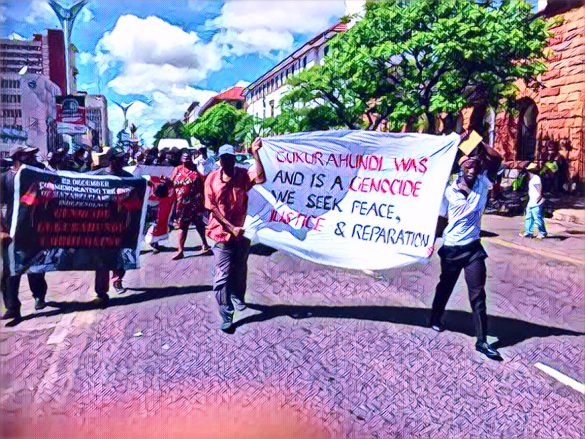In a significant move towards national healing, Zimbabwe’s President Emmerson Mnangagwa has announced the commencement of public hearings aimed at addressing the long-standing and deeply divisive issue of the Gukurahundi massacres. This chapter, darkened by the killing of an estimated 20,000 people in the Matabeleland and Midlands provinces during the 1980s, has lingered unresolved, casting a shadow over the nation’s progress since achieving independence in 1980.
The Gukurahundi, a term that evokes profound pain and unresolved grief among the affected communities, refers to the campaign of violence executed by the North Korea-trained Fifth Brigade against perceived dissidents of the new government. The atrocities committed during this period have remained a contentious issue, with many victims and their families still seeking justice, acknowledgement, and reparations.
President Mnangagwa, in a heartfelt address at the burial ceremony of national hero Retired Lieutenant Colonel Kenny Ridzai Mabuya, emphasized the government’s dedication to “find closure and healing for the scars from the disturbances that characterized the early years of our independence.” This pledge marks a departure from the stance of his predecessor, Robert Mugabe, under whose leadership the massacres were carried out and subsequently shrouded in silence and denial.
The approach to resolving the Gukurahundi issue involves a comprehensive and sensitive process, recognizing the deep emotional and social implications. Critics and traditional leaders, including Chief Mathema of Matabeleland South, have urged for a meticulous and inclusive approach, acknowledging the extensive nature of the atrocities and the wide-reaching impact on victims both within Zimbabwe and in the diaspora.
According to a report by Newsday, the call for transparency and a victim-centred approach has been echoed across the board, with suggestions for the government to release the findings of the Chihambakwe and Dumbutshena commissions, which investigated the violence but whose reports have never been made public.
In seeking a model for reconciliation and justice, comparisons have been drawn with Rwanda’s post-genocide Gacaca court system, which facilitated community-based justice and reconciliation, allowing for the voices of both victims and perpetrators to be heard. This system praised for its efficiency and cost-effectiveness, represents a potential framework for Zimbabwe as it grapples with its own legacy of violence and seeks pathways toward reconciliation.
As Zimbabwe sets forth on this challenging yet crucial journey of confronting its past, the global community watches with interest. The success of these public hearings and the broader process of addressing the Gukurahundi atrocities will not only be a measure of Mnangagwa’s commitment to justice and reconciliation but also a significant step towards healing a nation still burdened by the echoes of its tumultuous history.


